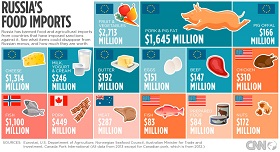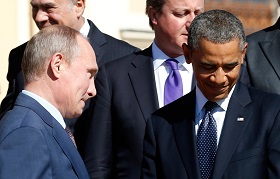Russia and the West have been dwelling upon the extremely difficult and delicate Ukrainian issue for over a year now. And no one knows for how long this matter will determine the Russia-West relations. Mass media are overwhelmed with various suggestions and prognosis for the future. Germany has for long been one of the closest Russian partners in the EU. Now Berlin and Moscow are experiencing one of the coldest periods of their friendship. RIAC has asked one of the German prominent experts, Andreas Metz, Director of Communications in the Committee on Eastern European Economic Relations, to share his views on Russia-Ukraine-EU knot and to draw some parallels between Russia and Iran under sanctions.
Russia and the West have been dwelling upon the extremely difficult and delicate Ukrainian issue for over a year now. And no one knows for how long this matter will determine the Russia-West relations. Mass media are overwhelmed with various suggestions and prognosis for the future. Germany has for long been one of the closest Russian partners in the EU. Now Berlin and Moscow are experiencing one of the coldest periods of their friendship. RIAC has asked one of the German prominent experts, Andreas Metz, Director of Communications in the Committee on Eastern European Economic Relations, to share his views on Russia-Ukraine-EU knot and to draw some parallels between Russia and Iran under sanctions.
Do you see any similarities between Iran under sanctions and Russia? How German business is doing in Iran?
I am not an expert on Iran but I know that it shows that sanctions don't work in the short run. And if you compare Iran to Russia, it is evident that Russia is much more integrated in the world economy due to its size, geography and history. It can´t be isolated like Iran.
Russia is far closer to Germany economically that Iran has ever been. In 2012 – our best year – Germany and Russia were trading goods for 80 billion Euro. The German-Iranian trade has only ever reached a volume of 5 billion Euro. The difference is striking. Russia is not internationally isolated. China, South Korea, India and Brazil are against implementing sanctions. Even Switzerland didn´t go for the whole package.
So far I would say that sanctions definitely had a negative impact on Russian economy, especially in the banking and energy sectors. But the most important factor for the Russian economy is the oil price. The longer sanctions remain, the easier it is for Russia to get used to them and find loopholes.
After China, Germany is the country which had the highest trade volume with Russia. But due to the Ukrainian crisis our exports to Russia went down by 6.5 billion Euro (18 percent) in 2014. In the first four months of 2015 we saw an additional minus of 34 percent. Small and medium sized companies, especially in the East, specializing on the Russian market, are suffering the most. They try to find other markets, survive and maintain their contacts. Getting a permission to continue exporting their product is one of their major goals, but this is a lengthy process. But in general, the German economy is in a good shape. Less than 3 percent of our goods are exported to Russia and other markets in the EU, in South-Eastern Europe or Asia are growing. In general, the crisis doesn't have an imminent effect on the German economy. Trade export is still going up. We are witnessing the lowest unemployment rate in the last 25 years, so these sanctions do not have much of a say in the German economy.
Do you see a way out of the sanctions?
While German economy is doing just fine, our bilateral relations with Russia have been significantly marred. The sanctions are a big psychological burden, investments are on hold, and distrust among business partners is growing. We are losing contacts, which cannot possibly be in the interest of politicians and hinders finding a suitable political solution.
Trade is a bridge and we need it both for political and economic benefit. Sanctions are a lose-lose situation for the whole European economy, and the country suffering the biggest damage is Ukraine. Because of this, my organization says, that we will have to soften our sanctions in exchange for political benefits from Russia.
What do you think Russia can do to lift the sanctions?
Both sides are sitting on the edge of a tree branch waiting who will be the first to come down from the top. Nobody wants to make the first step. Maybe it is possible to make a deal: Ukraine shouldn´t become a member of NATO. Some Russian reservations against the Association agreement between Ukraine and the EU should be taken into account and we should start talks on a common European market from Lisbon to Vladivostok. On the other hand, Russia should stop military campaigns in favor of the separatists. Ukrainian sovereignty and borders have to be respected. There has to be more pressure from the Russian side to stop fighting in eastern Ukraine and to get a demilitarized zone along the line of conflict. Russia should stop restricting trade with Ukraine and countries like Moldova and Georgia. No one is interested in a collapsing Ukraine, both sides have to contribute financially to help the country.
There has to be an autonomous status of the districts in eastern Ukraine and free regional elections as soon as possible. Concerning Crimea, I don´t see a solution in the short run. Western sanctions against this territory will stay for a long time. Russia’s actions violated international law, so as the Budapest Memorandum of 1994. The only way out would probably be a new referendum on the future of Crimea under international supervision.
Russia has already said that we are not against implementing an agreement on the EU-Ukrainian Association Agreement in 2016.
Russia has offered an agreement and the EU commission said that the trilateral talks in Brussels are quite constructive. It is a small sign of success but it is precious. It comes down to leaving the brute force scenario aside and focusing on rebuilding trust. Russians gave a reason not to trust them and Crimea is a proof of President Putin’s aggression. Putin staged the change of the government there. That undermined most of our relation basis built throughout the years. Nonetheless, mistakes had been made by both sides. We have to keep the open dialogue going on and find compromises. There are people who are ready to do it but still not enough of them.
Interviewed by Elena Alekseenkova, RIAC program manager






